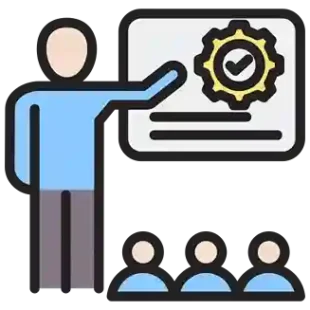
Aspiring to make a meaningful impact on young lives? Becoming a teaching assistant could be your calling. This role demands a unique blend of skills and qualities to create a supportive and engaging learning environment.
This guide will give you an idea of the top 10 teaching assistant skills needed to excel in this rewarding career.
Top 10 Teaching Assistant Skills
1. Patience and Empathy
Patience and empathy are listed as the first & most crucial teaching assistant skills. Building strong, supportive relationships with students is at the heart of effective teaching assistance. This requires exceptional patience and empathy. Understanding that students learn at different paces and encounter various challenges is crucial.
By actively listening to students, validating their feelings, and offering emotional support, TAs create a safe and inclusive space where students feel valued and encouraged.
This fosters trust and open communication, allowing students to seek help without fear of judgment. To take your teaching assistant skills to the next level, our Teaching Assistant Level 3 Diploma can help you immensely.
2. Adaptability
Adaptability is one of the best teaching assistant skills and qualities. The classroom is a dynamic environment characterized by constant change. A successful teaching assistant must be highly adaptable to thrive in this setting. This includes:
- Flexibility: Adjusting to unexpected changes in lesson plans, classroom routines, or student behavior.
- Problem-solving: Finding creative solutions to challenges that arise.
- Open-mindedness: Embracing new teaching methods and technologies.
- Resilience: Maintaining a positive outlook in the face of setbacks.
3. Organization and Time Management
Effective time management is essential for balancing the numerous responsibilities of a teaching assistant. This includes:
- Prioritization: Determining the most important tasks and allocating time accordingly.
- Planning and preparation: Organizing materials and resources in advance.
- Attention to detail: Ensuring accuracy in grading, record-keeping, and preparing materials.
- Multitasking: Handling multiple tasks simultaneously while maintaining focus.
4. Positive Attitude
A teaching assistant’s enthusiasm can significantly impact the classroom atmosphere. A positive and encouraging demeanor creates a welcoming and supportive environment where students feel motivated to learn. Having a positive attitude is one of the most required skills for a teaching assistant.
By celebrating students’ successes, offering constructive feedback, and maintaining a hopeful outlook, TAs can inspire students to reach their full potential. A positive attitude also contributes to a harmonious working relationship with teachers and colleagues.
5. Continuous Learning
Another key skill for a teaching assistant is continuous learning. Because the field of education is constantly evolving, continuous learning is essential for educational assistants. Staying updated on new teaching methodologies, curriculum changes, and educational technologies is crucial for providing effective support to students and teachers.
A growth mindset encourages TAs to seek out professional development opportunities, attend workshops, and explore innovative teaching strategies. By embracing lifelong learning, TAs can enhance their skills, stay motivated, and contribute to a dynamic and engaging learning environment.
6. Communication and Interpersonal Skills
Effective communication is the cornerstone of a successful teaching assistant. Building strong relationships with students, teachers, and parents is crucial for creating a supportive learning environment. This involves:
- Active listening: Understanding students’ needs and concerns.
- Clear and concise communication: Explaining concepts and instructions clearly.
- Building rapport: Establishing positive relationships based on trust and respect.
- Conflict resolution: Mediating disagreements and finding solutions.
7. Classroom Management
Creating a structured and engaging learning environment is essential for student success. Classroom management is one of the crucial skills for a teaching assistant. A skilled learning support assistant can:
- Establish routines: Implementing consistent daily procedures.
- Manage student behavior: Using positive reinforcement and redirection techniques.
- Organize the classroom: Creating a visually appealing and functional space.
- Supervise activities: Ensuring student safety and engagement during group work or independent tasks.
Our Complete Teaching Assistant Diploma can help you learn the necessary skills regarding the teaching assistant profession.
8. Instructional Support
Assisting teachers in delivering effective instruction is a key responsibility. Any lack of this specific teaching assistant skill can slow career growth. This skill involves:
- Preparing materials: Gathering resources and creating visual aids.
- Differentiating instruction: Adapting teaching methods to meet diverse student needs.
- Providing individual support: Offering one-on-one assistance with academic tasks.
- Leading small group activities: Facilitating interactive learning experiences.
9. Special Education and Inclusion
Creating an inclusive classroom where all students feel valued and supported is vital. A teaching assistant with knowledge of special education can:
- Implement IEPs: Assisting with individualized education plans.
- Provide accommodations: Adapting learning materials and activities for students with disabilities.
- Using assistive technology: Employing tools to support students with specific needs.
- Promoting inclusivity: Fostering a welcoming and accepting classroom culture.
If you have a specific focus on Special Education Needs (SEN) and want to build a career in that particular field, this SEN Teaching Assistant course is a great one to start with.
10. Professionalism and Ethics
Having high professionalism and ethical standards is one of the key skills for a teaching assistant. It helps to build trust and credibility. This includes:
- Confidentiality: Protecting student and staff information.
- Adherence to policies: Following school rules and regulations.
- Time management: Arriving on time and meeting deadlines.
- Continuous learning: Seeking professional development opportunities.
Develop Your Teaching Assistant Skills
It is never too late to upgrade and polish your teaching assistant skills. If you think you already have these 10 skills we talked about then you have the scope to upgrade yourself.
To excel in your role, focus on continuous development. Here are some strategies:
Seek Feedback
Regular feedback is essential for growth. Actively seek input from teachers, colleagues, and even students. Focus on specific areas for improvement rather than general feedback. Consider using a feedback form or conducting self-reflection to identify strengths and weaknesses.
Specific feedback examples:
- “I appreciate your patience with [student’s name]. Your ability to connect with him has made a significant difference.”
- “Your organization of classroom materials is exceptional. It creates a calm and efficient learning environment.”
- “Your enthusiasm is contagious. It’s inspiring to see how you motivate students to participate.”
Build Relationships
Strong connections with students, teachers, and parents are essential for a successful learning support assistant. Building rapport with students creates a supportive learning environment.
Collaborate with teachers to align your efforts with classroom goals. Involve parents in their child’s education through regular communication and updates.
Relationship-building tips:
- Learn students’ names and interests to show you care.
- Attend parent-teacher conferences when possible.
- Create a welcoming classroom atmosphere where students feel comfortable seeking help.
- Communicate effectively with parents through newsletters, emails, or phone calls.
Stay Updated
The education landscape is constantly evolving. Stay informed about the latest teaching methodologies, curriculum changes, and educational trends. Attend workshops, conferences, and online courses to expand your knowledge. Explore resources such as educational journals, online articles, and webinars.
Professional development ideas:
- Attend conferences focused on teaching assistants or special education.
- Take online courses on educational technology or classroom management.
- Join professional organizations for teaching assistants.
- Subscribe to educational newsletters or blogs.
Embrace Technology
Technology plays a significant role in modern education. You can utilise educational technology tools to enhance student engagement and support learning. Also, you can explore various apps, software, and online platforms that can be incorporated into the classroom.
Here are some technology integration tips:
- Use interactive whiteboards or projectors to deliver engaging lessons.
- Explore educational apps for differentiated learning.
- Create online resources or learning materials for students.
- Utilize educational software for assessment and data analysis.
Conclusion
If you want to pursue a career as a teaching assistant in the UK, these 10 skills will help you to achieve a rewarding career.
Having the most demanding teaching assistant skills in your CV will help you to stand out from your colleagues at your workplace.
 All Courses
All Courses Personal Development
Personal Development Business
Business Employability
Employability Management
Management Sports, Nutrition & Fitness
Sports, Nutrition & Fitness Microsoft Office
Microsoft Office Marketing
Marketing Health & Safety
Health & Safety Nursing & Care
Nursing & Care HR and Leadership
HR and Leadership Software
Software Counselling and Therapy
Counselling and Therapy Language
Language QLS Endorsed
QLS Endorsed Accounting
Accounting Teaching
Teaching IT
IT Psychology
Psychology Excel
Excel Teacher Training
Teacher Training Health and Care
Health and Care Photography
Photography Lifestyle
Lifestyle Physical & Mental Health
Physical & Mental Health Beauty
Beauty Powerpoint
Powerpoint Teaching & Education
Teaching & Education Animal Care
Animal Care Development
Development Bundle
Bundle Accounting & Finance
Accounting & Finance Networking & Design
Networking & Design Health & Fitness
Health & Fitness Leadership & Management
Leadership & Management Teaching & Special Education
Teaching & Special Education






